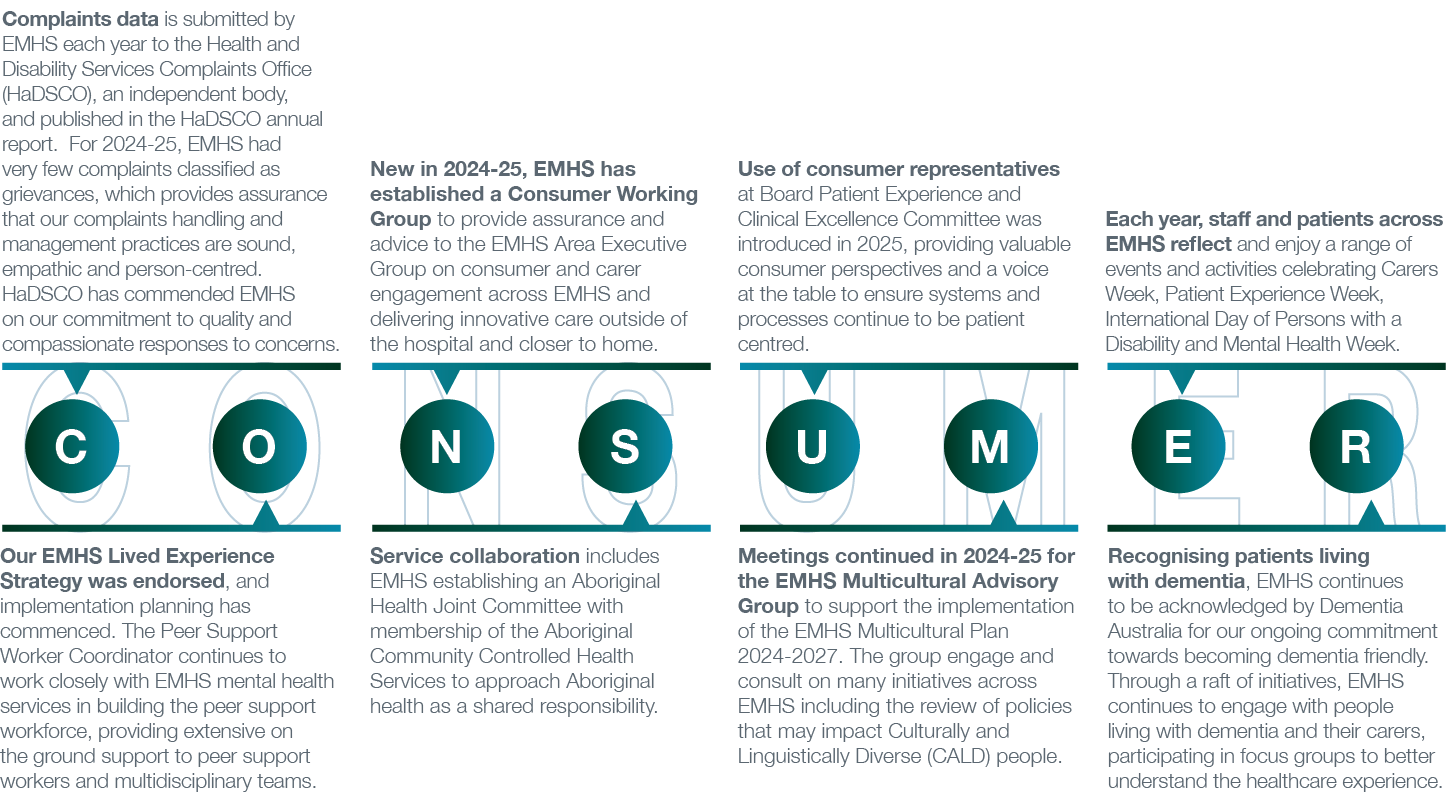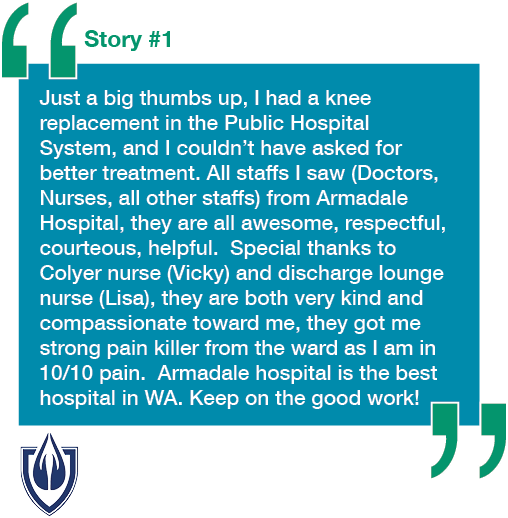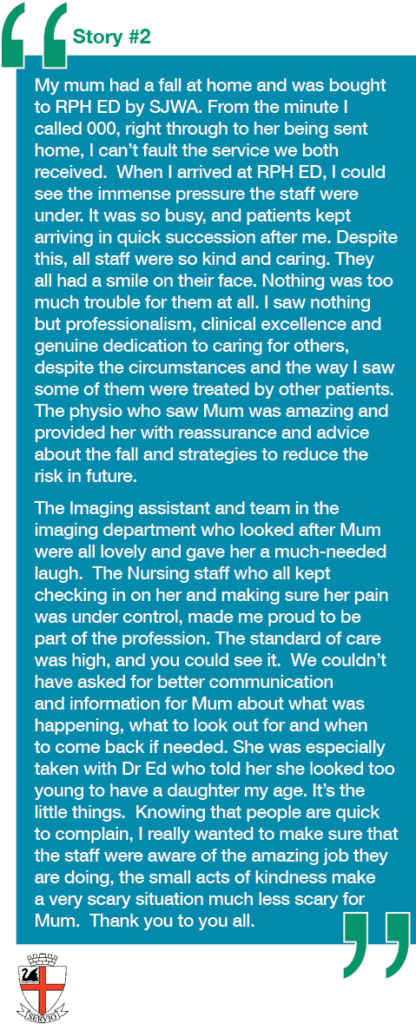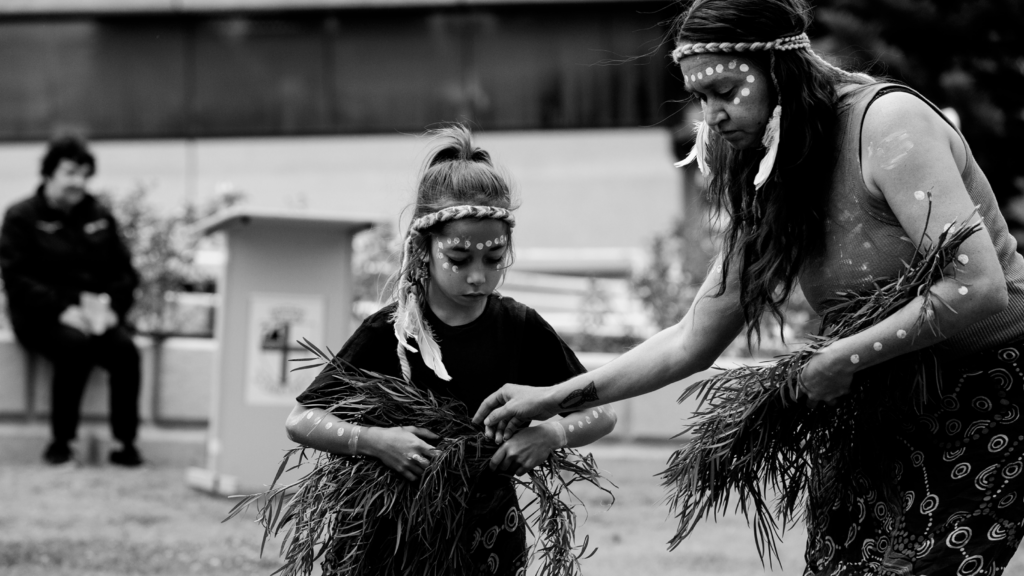Consumers and community
EMHS Multicultural Plan
The WA Multicultural Policy Framework (MPF) 2020 translates the principles and objectives of the WA Charter of Multiculturalism (2004) into multicultural policy priorities, outcomes, strategies and measures for WA public sector agencies.
The WA Charter of Multiculturalism demonstrates the WA Government’s commitment to multiculturalism and a multicultural policy position that embraces all of us, and is founded on 4 principles of civic values, fairness, equality and participation.
In line with the MPF and EMHS’ ongoing commitment to provide culturally responsive services and welcoming and inclusive workplaces, the EMHS Multicultural Plan 2024 – 2027 (the Plan) has been developed in consultation with internal and external stakeholders, including the EMHS Multicultural Advisory Group. Examples of EMHS’ achievements against the priorities of the Plan are outlined below.
Policy Priority 1: Harmonious and inclusive communities
Every Western Australian values cultural, linguistic, and religious diversity and feels that they belong.
EMHS celebrates cultural events including NAIDOC, Harmony Week and Reconciliation Week across sites and services and celebrated and promoted International Translation Day on 30 September 2024.
Interpreting and translation services are promoted and available across EMHS sites.
EMHS People and Culture are pursuing an EMHS Equity, Diversity and Inclusion Working group, to analyse, identify and report on access, equity and diversity gaps, opportunities and successes. EMHS is also progressing school-based placements of culturally and linguistically diverse (CaLD) students for two paid days per week for 18 months at EMHS whilst they complete Certificate II in Government.
The Byford Health Hub (BHH) program team continue to recruit Byford Community Advisory Group members with multicultural backgrounds to provide input into the planning and engagement of the program.
Policy Priority 2: Culturally responsive policies, programs, and services
- All Western Australians are informed of, and have equitable access to, government services.
- Programs and services are culturally appropriate and responsive to the needs of all Western Australians.
- Customised CaLD specific services are provided for those who need them.
- A workforce that is culturally competent and representative of its community and business and client needs.
The directory signs at the main entrance to Royal Perth Hospital (RPH) have been updated using plain English with appropriate icons. Navigation signage in the five main languages used by clients of our services is rolling out across targeted areas at RPH commencing with the Breast Clinic.
Welcome Packs for RPH and Bentley Health Service (BHS) have been translated into five additional main languages.
The Friends of RPH also continue to actively recruit volunteers with diverse backgrounds with 50 per cent identifying as CaLD.
St John of God Midland Public Hospital (SJGMPH) has a retreat on the ground floor of the hospital, which is a reflective space used by different faith denominations and supplies supportive ritual material. SJGMPH provides caregiver and consumer events that recognise, celebrate and promote CaLD communities with a strong focus on Aboriginal communities.
SJGMPH continues to actively be targeting recruitment and is further engaging with CaLD volunteers to support areas of need across SJGMPH.
The Armadale Health Service (AHS) catering team has redesigned the hospital menu to include a more diverse range of dishes reflective of different cultures.
Signage across AHS and Kalamunda Hospital (KH) includes universal iconography where appropriate, as well as interpreter iconography, and posters with QR codes or links to access information in other languages.
The quiet room at AHS is able to accommodate the spiritual and religious needs of different faith denominations, and is available to all staff, patients and visitors.
Kalamunda Hospital (KH) utilises communication cards to support communication with non-English speaking patients and family members until an interpreter can be secured.
Policy Priority 3: Economic, social, cultural, civic, and political participation
- Western Australians from CaLD backgrounds are equitably represented in employment and on boards, committees, and other decision-making bodies.
- WA’s CaLD community is harnessed to grow economic, social, cultural, civic, and political development.
The Armadale Kalamunda Group has engaged with multicultural consumers on projects and working groups and connected with Armadale, Gosnells and Kalamunda Councils to increase their membership pool.
The My Say survey for patients is now available in Arabic, Chinese (traditional and simplified), Italian and Vietnamese at RPH, BHS, AHS and KH.
Partnering with our community
Engaging and partnering with consumers and our community remains key to achieving our vision of healthy people, amazing care.
Improving the consumer experience
In 2024-25, EMHS completed a number of actions in support of the commitment to our community:

Hospital quality improvements 2024-25
Our hospitals have introduced a number of local quality improvements to enhance the consumer experience, including but not limited to:
- Armadale Health Service (AHS) Emergency Department (ED) Waiting Room Video – this will be played in the waiting room, providing patients with an overview of the typical journey through the ED and highlighting key support services.
- The AHS Maternity Unit has launched the Maternity Antenatal and Postnatal Service (MAPS) – a midwifery continuity program ensuring that women receive care from a known midwife during pregnancy and postpartum.
- A lactation consultant is now available seven days a week at AHS, increasing accessibility for women seeking lactation support.
- Maternity Journey Boards have been introduced in AHS patient rooms, enhancing communication and engagement in maternity care. Additionally, a Safety and Quality Consumer Board has been implemented.
- Work is underway on a Maternity Comprehensive Plan at AHS. This initiative ensures that women are actively involved in planning their care during labour and birth.
- The Dying to Know Day event was hosted at Kalamunda Hospital to encourage open conversations about end-of-life wishes, supporting individuals and families in making informed decisions.
- Kalamunda Hospital’s Compassionate Connectors Program, a three-year pilot initiative, will train community members to provide both practical and social support to individuals facing chronic and life-limiting illnesses.
- Reconfiguration of the toilet in F Block at Bentley Health Service (BHS) in response to consumer feedback regarding accessibility for persons with disability.
- Establishment of the Royal Perth Bentley Group (RPBG) Aboriginal Health Department.
- Establishment of RPBG Aboriginal Consumer Advisory Group, Emergency Department Consumer Advisory Group and incorporation of Integrated Services Consumer Advisory Group (Next Step) from Mental Health Commission to RPBG.
- Development of the Bear with Us campaign at Royal Perth Hospital (RPH), BHS and Kalamunda Hospital – to raise awareness amongst staff and patients on the importance and requirement to check three points of identification for every patient.
- Purple Bags program – providing patients with special comforts if they are expected to pass away at RPH or BHS. This is supported by our volunteers who hand-craft blankets for our patients and collate beautiful bags of items.
- Delivery of the Welcome Pack in the top five languages for RPH and BHS, as well as improving ease of access by deploying QR code stickers at patient bedsides that link to resources.
- Implementation of Day Surgery Communications Nurse at RPH – to improve communication lines between clinical staff and patients/families. This was an outcome from a complaint where a patient’s surgery was cancelled on the day of surgery.
- Integration of consumer representatives into RPBG Staff Forums, to provide a patient perspective to staff.
- Establishment of the Rhythm to Recovery program, delivered by mental health consumers and carers for RPH and BHS patients in our mental health wards.
- St John of God Midland Public Hospital (SJGMPH) has broadened the scope of Net Promoter Score (NPS) Survey to include Outpatients and mental health specific questions.
- SJGMPH has implemented consumer representatives on SAC 1 (clinical incident) review panels.
Consumer feedback
Consumers provide valuable feedback and contribute to improving the safety and quality of services.
The use of the Australian Commission on Safety and Quality in Health Care’s Australian Hospital Patient Experience Question Set (AHPEQS) across EMHS hospitals has meant the capture of validated, standardised patient experience questions by way of an SMS based survey to patients following discharge or leaving the hospital.
Since September 2020, EMHS has received feedback from more than 135,000 consumers.
EMHS Net Promotor Score (NPS) rating
| Period | NPS | Number of respondents | Response rate |
|---|---|---|---|
| 2024-25 | 70.67 | 14,688 | 26.00% |
AHPEQS results summary
| AHPEQS question | Response |
| My views and concerns were listened to | 92.95% |
| My individual needs were met | 91.74% |
| I felt cared for | 92.78% |
| I was involved as much as I wanted in making decisions about my treatment and care | 89.84% |
| I was kept informed as much as I wanted about my treatment and care | 89.95% |
| As far as I could tell the staff involved in my care communicated with each other about my treatment | 85.85% |
| I received pain relief that met my needs | 91.97% |
| When I was in the hospital I felt confident in the safety of my treatment and care | 91.63% |
| Overall the quality of the treatment and care I received was very good | 90.97% |
Compliments and complaints
EMHS continues to subscribe to the use of Care Opinion, an independently controlled, online platform enabling members of the public to tell us about their experience with our services. Feedback is used to improve services as well as to recognise staff and teams who go above and beyond our patients’ expectations.
In 2024-25, through our formal processes, EMHS received:

- 2,940 compliments via formal feedback processes
- 64 entirely complimentary stories via the public sharing platform Care Opinion
While this recognises only compliments provided through a formal mechanism, it should be acknowledged that there are a multitude of compliments and thanks fed back to staff informally and directly by patients, carers and their loved ones.
EMHS also received:

- 789 complaints via formal feedback processes
- 78 complaints via Care Opinion
EMHS manages patient feedback consistent with the WA Health Complaints Management Policy (2024), with all complaints acknowledged, investigated and responded to within appropriate timeframes, and quality improvement activities initiated to address issues where appropriate.
Example of a change arising from patient feedback
Situation
Patients and their families provided feedback about the challenges of where to find the correct area to attend appointments and other facilities our hospitals have, including the triage system in Emergency and ward orientation.
Changes implemented as a result
EMHS hospitals have introduced meet and greet programs with dedicated volunteers to offer support to patients and their families. They provide a friendly face who deliver information in a warm, welcoming and personable way. Volunteers are provided training including general orientation to the ward, hand hygiene and services available to patients.
Our volunteers assist patients and consumers in many ways including:
- wayfinding
- explaining the process of Triage in Emergency, assisting in keeping the Emergency waiting room tidy and assisting visitors with their requests to go through to see a patient who has been taken through for assessment
- ward orientation covering access to bathrooms, how to use paid Television services, keeping valuables safe while in hospital, information regarding meals in hospital and where to find the gift shops run by volunteers in our hospitals
- providing company to patients who may not have family or support close by.
Evaluation of the program showed improved patient satisfaction with patients feeling welcomed on arrival to the ward where they were provided useful information which made a positive impact to the patients stay. Volunteers also felt they were able to provide a meaningful service and able to contribute positively to the patient’s stay in hospital.
Examples of stories shared from Care Opinion



